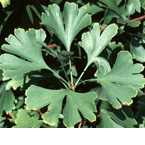Ginkgo

On this page:
Introduction
This fact sheet provides basic information about ginkgo—common names, what the science says, potential side effects and cautions, and resources for more information.
The ginkgo tree is one of the oldest types of trees in the world. Ginkgo seeds have been used in traditional Chinese medicine for thousands of years, and cooked seeds are occasionally eaten. Historically, ginkgo leaf extract has been used to treat a variety of ailments and conditions, including asthma, bronchitis, fatigue, and tinnitus (ringing or roaring sounds in the ears). Today, folk uses of ginkgo leaf extracts include attempts to improve memory; to treat or help prevent Alzheimer’s disease and other types of dementia; to decrease intermittent claudication (leg pain caused by narrowing arteries); and to treat sexual dysfunction, multiple sclerosis, tinnitus, and other health conditions.
Extracts are usually taken from the ginkgo leaf and are used to make tablets, capsules, or teas. Occasionally, ginkgo extracts are used in skin products.
What the Science Says
- Numerous studies of ginkgo have been done for a variety of conditions. Among the most widely researched are dementia, memory impairment, intermittent claudication, and tinnitus.
- An NCCAM-funded study of the well-characterized ginkgo product EGb-761 found it ineffective in lowering the overall incidence of dementia and Alzheimer's disease in the elderly. Further analysis of the same data also found ginkgo to be ineffective in slowing cognitive decline, lowering blood pressure, or reducing the incidence of hypertension. In this clinical trial, known as the Ginkgo Evaluation of Memory study, researchers recruited more than 3,000 volunteers age 75 and over who took 240 mg of ginkgo daily. Participants were followed for an average of approximately 6 years.
- Some smaller studies of ginkgo for memory enhancement have had promising results, but a trial sponsored by the National Institute on Aging of more than 200 healthy adults over age 60 found that ginkgo taken for 6 weeks did not improve memory.
- Overall, the evidence on ginkgo for symptoms of intermittent claudication has not yet shown a significant benefit for this condition, although several small studies have found modest improvements. There is conflicting evidence on the efficacy of ginkgo for tinnitus.
- Other NCCAM-funded research includes studies of ginkgo for symptoms of multiple sclerosis, intermittent claudication, cognitive decline, sexual dysfunction due to antidepressants, insulin resistance, and short-term memory loss associated with electroconvulsive therapy for depression.
Side Effects and Cautions
- Side effects of ginkgo may include headache, nausea, gastrointestinal upset, diarrhea, dizziness, or allergic skin reactions. More severe allergic reactions have occasionally been reported.
- There are some data to suggest that ginkgo can increase bleeding risk, so people who take anticoagulant drugs, have bleeding disorders, or have scheduled surgery or dental procedures should use caution and talk to a health care provider if using ginkgo.
- Fresh (raw) ginkgo seeds contain large amounts of a chemical called ginkgotoxin, which can cause serious adverse reactions—even seizures and death. Roasted seeds can also be dangerous. Products made from standardized ginkgo leaf extracts contain little ginkgotoxin and appear to be safe when used orally and appropriately.
- Tell all your health care providers about any complementary health practices you use. Give them a full picture of what you do to manage your health. This will help ensure coordinated and safe care. For tips about talking with your health care providers about complementary and alternative medicine, see NCCAM's Time to Talk campaign.
Search the scientific literature for potential herb-drug interactions
Sources
- Brinkley TE, Lovato JF, Arnold AM, et al. Effect of Ginkgo biloba on blood pressure and incidence of hypertension in elderly men and women. American Journal of Hypertension. 2010;23(5):528–533.
- DeKosky ST, Williamson JD, Fitzpatrick AL, et al. Ginkgo biloba for prevention of dementia: a randomized controlled trial. Journal of the American Medical Association. 2008;300(19):2253–2262.
- Ginkgo. Natural Medicines Comprehensive Database Web site. Accessed at www.naturaldatabase.com on August 20, 2009.
- Ginkgo (Ginkgo biloba L.). Natural Standard Database Web site. Accessed at www.naturalstandard.com on August 20, 2009.
- Ginkgo biloba leaf extract. In: Blumenthal M, Goldberg A, Brinckman J, eds. Herbal Medicine: Expanded Commission E Monographs. Newton, MA: Lippincott Williams & Wilkins; 2000:359–366.
- Snitz BE, O'Meara ES, Carlson MC, et al. Ginkgo biloba for preventing cognitive decline in older adults: a randomized trial. Journal of the American Medical Association. 2009;302(24):2663–2670.
- Solomon PR, Adams F, Silver A, et al. Ginkgo for memory enhancement: a randomized controlled trial. Journal of the American Medical Association. 2002;288(7):835–840.
- Strømgaard K, Vogensen SB, Nakanishi K. Ginkgo biloba. In: Coates P, Blackman M, Cragg G, et al., eds. Encyclopedia of Dietary Supplements. New York, NY: Marcel Dekker; 2005:249–257.
For More Information
NCCAM Clearinghouse
The NCCAM Clearinghouse provides information on NCCAM and complementary health approaches, including publications and searches of Federal databases of scientific and medical literature. The Clearinghouse does not provide medical advice, treatment recommendations, or referrals to practitioners.
PubMed®
A service of the National Library of Medicine (NLM), PubMed® contains publication information and (in most cases) brief summaries of articles from scientific and medical journals.
Office of Dietary Supplements (ODS), National Institutes of Health (NIH)
ODS seeks to strengthen knowledge and understanding of dietary supplements by evaluating scientific information, supporting research, sharing research results, and educating the public. Its resources include publications (such as Dietary Supplements: What You Need to Know), fact sheets on a variety of specific supplement ingredients and products (such as vitamin D and multivitamin/mineral supplements), and the PubMed® Dietary Supplement Subset.
NIH National Library of Medicine's MedlinePlus
This publication is not copyrighted and is in the public domain. Duplication is encouraged.
* Note: PDF files require a viewer such as the free Adobe Reader.
